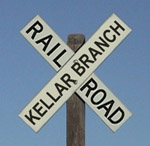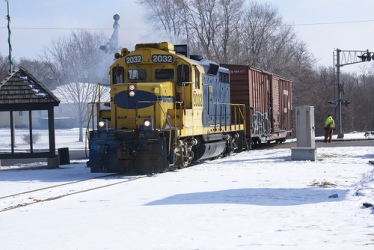Peoria Heights is a funny place.
First, the Village kicks Pioneer Industrial Railway off the line for a couple of years, saying that their contract has expired. Then when Pioneer regains operating authority, the Village complains that Pioneer hasn’t been keeping up their end of the contract. That’s like locking the busboy out of the restaurant and then criticizing him for not cleaning the tables.
Then the Village accuses Pioneer of not doing the things that the Village is responsible for in their contract. They want Pioneer to clean up brush that is more than ten feet from the railroad bed, which is explicitly stated in the contract to be the City’s/Village’s responsibility. They send a threatening, contemptuous letter to Pioneer threatening them with eviction if they don’t clean up the Village’s underperformance.
Then the Village scoffs when Pioneer decides not to help pay for a portion of the cost of the engineering study to look at the feasibility of building a trail next to the Kellar Branch rail line. Evidently, the Heights wants Pioneer to go away but expects them to be a partner at the same time. Genius.
[Mayor] Allen said [Pioneer CEO Mike] Carr’s comments blaming the village’s stance regarding the lease are nothing more than a “cop out.”
“That’s not a surprise and I feel . . . it gives them a convenient avenue out,” Allen said.
A cop out. An avenue out. Out of what? An offer of help? He makes it sound like Pioneer is trying to get out of some sort of obligation, when he’s the one who’s picking a fight. It’s like someone offering to help you move, you spitting in their eye, and then you acting all offended when they don’t want to help you anymore. “Aw, they’re just using that spit in their eye as a convenient avenue out.” Yeah, sure.
Even though Pioneer withdrew its offer to help pay for the rail/trail study, they are still trying to cooperate with Village officials. In a letter sent to the Village on April 14, Pioneer offered to help clean up the Village’s mess if the Village would meet them halfway:
Within the [next] few weeks Pioneer Industrial Railway Co. (“PIRY”) will be performing maintenance work on the tracks, with particular attention to the minor washouts pointed out in the Randolph & Associates report you forwarded.
While weed and brush control beyond the roadbed is entirely the responsibility of the Village under the Agreement, PIRY forces will be working on the line, and we are willing to assist the Village with the brush issues in the ditches and beyond the roadbed. Specifically, PIRY is willing to provide the labor to remove some of the brush and trees, if the Village will provide the equipment to dispose of the material. I believe this is a very generous offer, and is being made in a spirit of good faith cooperation. I urge the Village to accept it.
Finally, I once again must insist that the Village take immediate action to remove Central Illinois Railroad Co. from the Kellar Branch, and address the issue of compensation to PIRY. The Village is in breach of its obligations under the Agreement, and PIRY reserves the right to enforce the Agreement, by appropriate action, if the Village does not address this matter within ten (10) days.
The Village will reveal its true colors with its response to this request. If they’re really interested in abating the situation and cooperating, they will provide for what Pioneer asked. If this was all just a set up — if it’s nothing more than the Village contriving an “out” from their contractual obligations and/or attempting to bully Pioneer off the tracks — they’ll balk at the request.

 You may recall that Pioneer Industrial Railway
You may recall that Pioneer Industrial Railway 